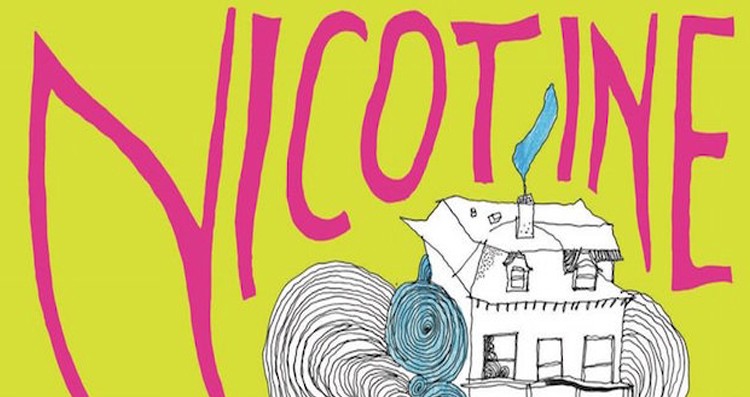Books & Culture
Businessmen and Squatters Clash in Nell Zink’s Nicotine
A new social commentary explores the darkly comedic intersection of capitalism and anarchy

Nell Zink is back with her third novel Nicotine, a wry social commentary in which a Jersey City squat is coopted by a nefarious businessman. The squatters are forced to scatter, and rooms that were built from scavenged material are transformed into state of the art yoga and puppet making studios. The kitchen where residents prepared meals foraged from dumpsters is converted to a café with expensive drinks. In this darkly comedic feud between anarchists and capitalists, Zink lays bare how the aesthetics of idealism are appropriated by corporate opportunists and subsequently fed to an unwitting and unquestioning public. As the title suggests, this novel is both addictive and jolting before leaving a final harsh, corrosive taste.
Zink lays bare how the aesthetics of idealism are appropriated by corporate opportunists.
At the beginning of the book, protagonist Penny Baker has just graduated business school and has taken on the responsibility of caring for her dying father. Norm Baker is a spiritual leader with a cult following, but despite his teachings of openness and transcendence, Norm’s death is common. It is slow, and he is scared. Penny is overwhelmed by grief, loss, and classic uncertainty of an unmoored post grad.
The novels tone changes drastically when Penny makes a pilgrimage to visit her fathers’ childhood home in Jersey City. When she arrives she is surprised to see the word “Nicotine” in bold letters on the façade of the house. She knocks on the door and meets Rob, a resident who runs a bike coop in the garage. Rob gives Penny a tour of the house and introduces her to Sorry and Jazz. She soon learns that the squat is named Nicotine because its residents are chain smokers who resent being penned out of many public spaces. Penny, an avid smoker, decides to move in.
After a blissful week at Nicotine, Penny’s brother Matt, a corporate suit type, enters the scene. He brutally and efficiently evicts the squatters and hires cheap undocumented laborers to refurbish the house. He perversely christens the new structure The Baker Center as a false tribute to his father, and acquires 501 © (3) status. Rob, Jazz and Sorry flee, and a dejected Penny decides to live in a neighboring squat. Ironically, Penny then takes a job at the bank her mother works at. Despite her affinity for the anarchist lifestyle, she commutes into New York City each day to participate in the corporate capitalism her peers so distain, and returns to the squatters at night. Even Penny is not immune to the comforts of convention, and participates the community and solidarity squat living provides despite her profession.
Matt and Rob embody two extremes: crude capitalism versus a radical denial of consumerism.
Matt is driven by desire to acquire money and power, and sees human emotion and sentimentality as weakness. Rob, on the other hand, is gentle and welcoming, and believes that community goodwill and effort can trump capitalism. These two polar ideologies butt heads and mingle in Penny, who is young and navigating the adult world for the first time. Zink notes multiple times her attention to her wardrobe: she adorns herself with bangles and flowing skirts when she goes to squatter functions, and wakes up early to clad herself in a business suit and a tight bun. She is able to try different lifestyles on for size, and her ultimate style is a patchwork of these two disparate worlds.

The scene in which the Norm Baker Center opens is perhaps Zink’s most bitingly satirical. A crowd of Norm’s followers gather to pay homage on opening night. A crossfaded Penny is called up to the stage to make a speech. She stutters before attempting to invoke the buzzwords of Norm’s philosophy. Despite the fact that these phrases come out warped and meaningless, the crowd enthusiastically repeats her chant. When the rally ends, there is a “final round of cheering and applause,” and, “in response, several people come inside to drink tap water and use the bathroom,” a comically disjointed response. Over the next few days, Rob, who has returned, witnesses “puppeteers in various stages of blissful self-delusion,” and supposed anti capitalists sipping expensive cappuccinos. The tussle between squatters and profiteers doesn’t stop there though. You’ll have to read the rest of the book to see who claims Nicotine.







